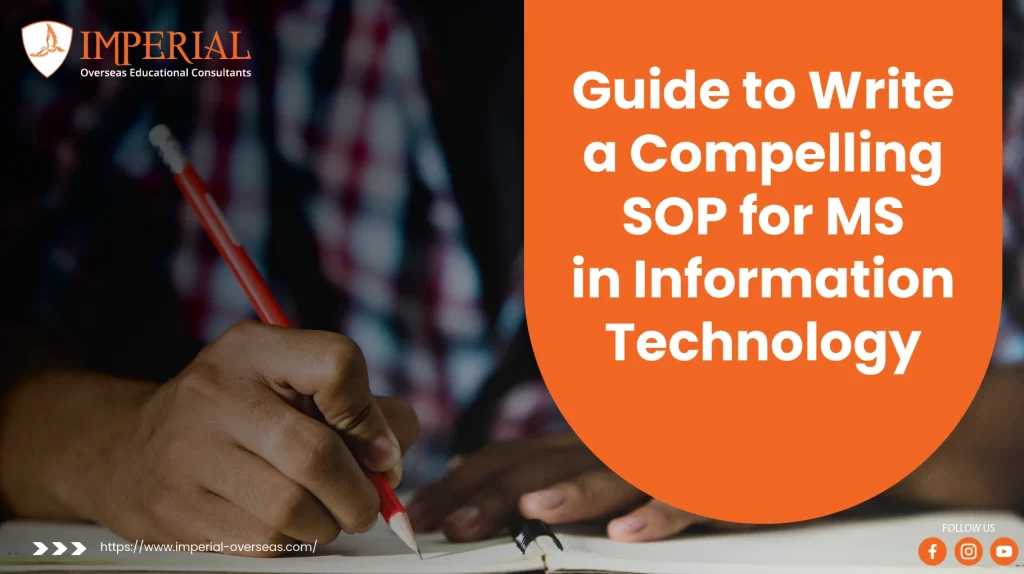


Writing a statement of purpose (SOP) for a master’s program in IT is crucial for your application. It’s not just another essay about yourself; it’s your opportunity to show the admissions committee why you’re a unique and valuable candidate.
Here are some tips, simplified for clarity, to help you craft a powerful SOP
Admissions committees place a hefty emphasis on this document. Understand that the SOP is vital. They use it to gauge your interest and determine your fit for their program.
Table of Contents
1. Generic Openings: Far too many SOPs start with clichés, failing to capture the attention of the admissions committee. Explain what about the IT course materials and learning modules at your target institution that drew your interest. Include notable research by academics and educators.
2. Overused Phrases: Most SOPs tend to be structured similarly, and students often copy-paste or edit from templates, making their content sound generic and irrelevant.
3. Lack of Originality: Admissions committees sift through countless applications, and your goal is to make your SOP stand out.
4. Address Key Questions: Anticipate and answer the questions that the committee is looking for in your SOP like;
1. Tell Stories, Not Statements
Craft your SOP like a story, not a dry academic piece. We remember stories more than plain statements. Share personal experiences to connect with the reader emotionally.
Convey the message in a way that it’s more likely to be remembered by the admissions committee after reviewing hundreds of applications. Stories connect with people, while statements don’t.
2. Quantify Your Achievements
While storytelling is essential, you can make your SOP even more convincing by incorporating numbers. Numbers add authenticity and authority to your story. Instead of just narrating your experiences, show results through quantifiable data. This will make your story more realistic and impressive.
3. Be Specific
Avoid vague statements like “I love this field.” Explain why you love it, what led you to choose it, what skills you aim to acquire, and how it complements your personality. Be direct and to the point, but avoid arrogance. It’s this level of depth that the admissions committee seeks in an SOP.
4. Customize Your Essay
Tailor your SOP for each institution, demonstrating your fit for that specific IT Master’s program. Mention what you admire about the university, its facilities, professors, and courses.
5. Use a Formal Yet Conversational Tone
Striking the right tone in your SOP is essential. Aim for a balance between formality and friendliness. Your language should be professional but not too stiff. Avoid humor, but don’t be overly serious. Maintain a respectful yet conversational tone throughout your SOP.
6. Indirect Self-Portrayal
Your SOP should implicitly convey several qualities without explicitly stating them like;
Subtly portray qualities such as determination, teamwork, and the ability to meet deadlines without explicitly listing them.
7. Addressing Problems
If you’ve had any academic setbacks or career gaps, don’t ignore them. Honesty is essential. Explain the reasons behind these issues and, more importantly, discuss how you’ve overcome them. This demonstrates your resilience and ability to learn from your experiences.
8. Research the Universities
Take the time to study each university’s specific features, courses, professors, and facilities. Mention why you’re interested in that particular university. This personalized touch demonstrates that you’ve invested effort in understanding what makes each institution unique.
9. Proofread and Seek Feedback
Your SOP must be error-free. Typos and grammatical mistakes create a poor impression. After you’ve completed your SOP, thoroughly proofread it. Ask friends, family, or mentors to review it as well. Fresh perspectives can help you refine your statement. If possible, seek advice from your professors who have experience in reviewing SOPs.
Your SOP for a master’s program in IT is your chance to make a strong impression and stand out from the crowd. Creating a compelling SOP is not something that can be done overnight. But the effort you invest in crafting an outstanding SOP can be the key to unlocking the doors of your dream graduate program.
Imperial Overseas is your trusted ally in making your dream of studying abroad a reality. Our experienced team will guide you, from choosing the right universities to helping with visas and getting you ready for your academic journey. Contact us today to turn your study abroad dreams into a reality!